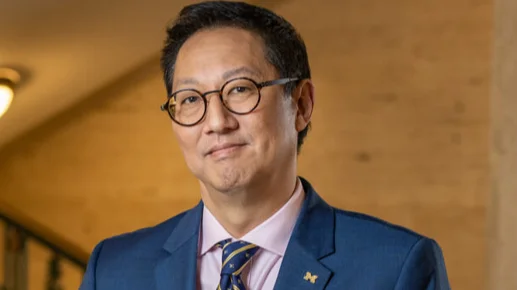Santa J. Ono, Ph.D. President at University of Michigan - Ann Arbor | Official website
Santa J. Ono, Ph.D. President at University of Michigan - Ann Arbor | Official website
Government regulation continues to play a central role in shaping business practices, according to Norm Bishara, professor of business law and ethics at the University of Michigan’s Ross School of Business. Bishara discussed how policy decisions are made and what defines the relationship between business and government during periods of political pressure.
Bishara explained that corporations were originally created by the state to spread financial risk and achieve social goals such as exploration and trade. In return, these companies had obligations to the state, including taxes and services. Over time, as both governance and business have grown more complex, regulation has continued to serve as a way to maintain consumer protection, public health, workplace safety, environmental protection, fair competition, and tax collection.
“In the current debate, perspectives differ on how much regulation is too much in terms of harming business activity, which might hamper innovation and even national security,” Bishara said. “The business-regulator relationship can range from adversarial to collaborative. Either end is arguably a healthy part of our businesses and policy environment.”
He noted that regulatory oversight often increases after crises or public outcry—such as new labor laws following the Industrial Revolution or antitrust measures after abuses of corporate power in late 19th-century United States. The ongoing debate about corporate responsibilities beyond legal compliance remains active.
“This debate has come roaring back, along with a feeling of policy whiplash,” Bishara said. “A few years ago, companies pushed ahead with policies on diversity, for example. Those efforts have retreated in response to immense political pressure and even regulatory scrutiny.”
Despite changes over time, some aspects remain consistent: businesses seek predictability from policymakers so they can make long-term investments while maintaining a positive societal image for employee recruitment and retention purposes.
Looking ahead, Bishara pointed out that efforts to bring manufacturing back to the U.S. coincide with rising automation and artificial intelligence capabilities as well as increasing energy demands. He said this shift will impact job requirements for employees but may also lead to job loss or social disruption.
“There will be new jobs we can’t predict but also social upheaval and job loss,” he said. “I’m interested in how this future of work is going to play out for employees and what companies and governments can do together to ease this transition.”
Regarding public-private partnerships addressing current challenges in business and policy making, Bishara observed: “It’s widely accepted that the government should be more efficient and learn from the private sector but also a growing awareness that sometimes the government’s goals can’t be judged by the yardstick of business efficiency.” He questioned whether Americans would support privatizing services like the U.S. Postal Service or cutting government healthcare when directly affected.
Bishara emphasized transparency’s importance in building trust between businesses and government agencies: “Transparency is a prerequisite to good governance and decision making but it’s not the end of the effort.” He added that effective policymaking requires time for careful evaluation rather than rushed changes that could have unintended negative consequences.
“Businesses can demand the bureaucracy stays above politics and produces reliable data,” he said. For instance, companies depend on impartial research from sources such as the Bureau of Labor Statistics or Congressional Budget Office.
As faculty director for Michigan Ross’ Carson Scholars program—which aims to educate students about navigating public policy—Bishara highlighted its focus on understanding how businesses interact with policymakers:
“For nearly 20 years, the program’s goal has been to educate students on navigating the public policy process. If they understand the system and levers businesses have, they can effectively engage and achieve a competitive advantage,” he said.
He added: “Students come away with an accurate sense of how business and government should work together—and how they often fail—to achieve business and social aims.” The program provides direct exposure through interactions with lawmakers, regulators, lobbyists, think tank experts and other advocates in Washington D.C., which will continue despite upcoming funding adjustments.






 Alerts Sign-up
Alerts Sign-up